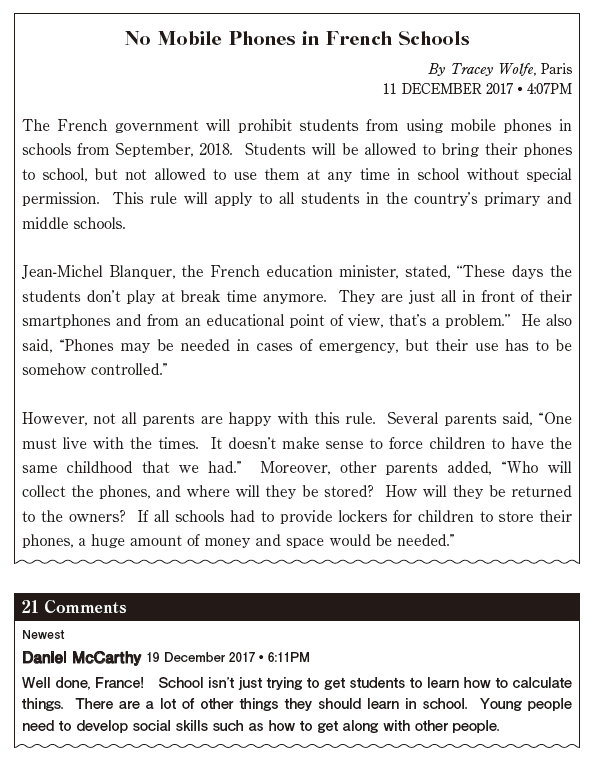Your English teacher gave you an article to help you prepare for the debate in the next class. A part of this article with one of the comments is shown below.

問1 According to the rule explained in the article, students in primary and middle schools in France won’t be allowed to ( ).
1. ask their parents to pay for their mobile phones
2. bring their mobile phones to school
3. have their own mobile phones until after graduation
4. use their mobile phones at school except for special cases
問2 Your team will support the debate topic, “Mobile phone use in school should be limited.” In the article, one opinion (not a fact) helpful for your team is that ( ).
1. it is necessary for students to be focused on studying during class
2. students should play with their friends between classes
3. the government will introduce a new rule about phone use at school
4. using mobile phones too long may damage students’ eyes
問3 The other team will oppose the debate topic. In the article, one opinion (not a fact) helpful for that team is that ( ).
1. it is better to teach students how to control their mobile phone use
2. students should use their mobile phones for daily communication
3. the cost of storing students’ mobile phones would be too high
4. the rule will be applied to all students at the country’s primary and middle schools
問4 In the 3rd paragraph of the article, “One must live with the times” means that people should ( ).
1. change their lifestyles according to when they live
2. live in their own ways regardless of popular trends
3. remember their childhood memories
4. try not to be late for school
問5 According to his comment, Daniel McCarthy 15 the rule stated in the article.
1. has no particular opinion about
2. partly agrees with
3. strongly agrees with
4. strongly disagrees with
【解説】問1 正解率 80.0%
「その記事で説明されたルールによると、フランスの初等・中等の学生は ( ) することを許されない」
本文の第一段落の内容ですね。
1. ask their parents to pay for their mobile phones
「携帯電話の支払いを親に頼む(ことが許されない)」
3. have their own mobile phones until after graduation
「卒業まで携帯電話持つ(ことが許されない)」
この二つはそんなことは書いていませんし、常識に照らし合わせてありえませんよね。政府によってそんな法律が作られたら、ちょっと怖くないですか?
2. bring their mobile phones to school
「学校に携帯電話を持ってくる(ことが許されない)」
これはありえますね。というか、日本の小・中学校の多くは校則でこうなっているんじゃないですか? ですが、本文にはこうあります。
「学生は学校に携帯電話を持ってくることを許されます」
ということで、この選択肢は違います。
4. use their mobile phones at school except for special cases
「特別な場合を除いて携帯電話を使う(ことが許されない)」
これについては、先ほどの本文の続きにこうあります。
「しかし特別な許可なしに学校内で使うことは、いつでも許されない」
ということで、正解は「4」です。
【解説】問2 正解率 41.6%
「あなたのチームが『学校での携帯電話の使用を制限すべき』というテーマを支持するとき、( ) という記事内のある意見 (事実ではない) があなたのチームに役立ちます」
3. the government will introduce a new rule about phone use at school
「政府は学校での電話について新しいルールを導入するでしょう」
この話はこの記事のメインテーマで、思い切り書いています。しかしこれは「事実」です。この問題は「意見」を聞かれていますので、この選択肢はダメです。
1. it is necessary for students to be focused on studying during class
「生徒にとって授業中、勉強に集中することが必要です」
4. using mobile phones too long may damage students’ eyes
「携帯電話を長いこと使うと、学生の目にダメージがあるかもしれない」
この二つはそれっぽいですが、残念ながら本文に書いていません。
「携帯電話を制限すべき」という意見については、一番下の Comments にある Daniel McCarthy の意見を見ればよいですね。
「若者は他人と仲良くする方法などの、社会的なスキルを成長させる必要がある」
これは選択肢 2. の内容とおおむね同じです。
2. students should play with their friends between classes
「授業の間 (休み時間)、学生は友達と遊ぶべきです。」
ということで、正解は「2」です。
【解説】問3 正解率 48.8%
「他のチームがその討論のテーマに反対するとき、記事内の ( ) という意見が役に立ちます」
4. the rule will be applied to all students at the country’s primary and middle schools
「そのルールは国内の初等、中等学校のすべての生徒に適用される」
この内容は本文に書かれてありますが、「事実」です。今回の問題では「意見」を聞かれていますので、この選択肢はダメです。
2. students should use their mobile phones for daily communication
「学生は日々のコミュニケーションのために、携帯電話を使うべきだ」
これは書かれていませんね。でも実際には、学生の携帯電話の目的はこれですよね。
1. it is better to teach students how to control their mobile phone use
「携帯電話の使用をコントロールする方法を、学生に教える方が良い」
第二段落の最後で、教育大臣の Jean-Michel Blanquer がこう言っています。
「しかし、それら (携帯電話) の使用は何らかの方法でコントロールしなければならない」
コントロールが出てくるのはここぐらいです。そしてこれは大人が学生の携帯使用をコントロールするという話です。コントロールの方法を教えるという話ではありません。この選択肢も違います。
第三段落の最後にこうあります。
「もしすべての学校が子供たちが携帯電話を保管するロッカーを供給したら、巨大な額のお金とスペースが必要となるでしょう」
これは選択肢 3. の内容と同じです。
3. the cost of storing students’ mobile phones would be too high
「学生の携帯電話を預かるコストが高くなりすぎるでしょう」
ということで正解は「3」です。
【解説】問4 正解率 54.1%
「記事の第三段落にある “One must live with the times” は ( ) すべきだということを意味しています」
これは本文にある、その続きの文を見るとよいです。
「私たちが過ごしたものと同じ子供時代を、過ごすことを (今の) 子供たちに強制するのは意味がありません」
これを踏まえて考えると「One must live with the times / 時間とともに生きるべき」は、選択肢 1. の内容に近いですね。
1. change their lifestyles according to when they live
「生きているとき (時代) に合わせて、生活様式を変える」
ということで、正解は「1」です。
2. live in their own ways regardless of popular trends
「人気の流行にかかわらず自身のやり方で生活する」
3. remember their childhood memories
「子供の頃の記憶を覚えている」
4. try not to be late for school
「学校に遅れないようにする」
といったその他選択肢は、的を外していますね。
【解説】問5 正解率 62.7%
「Daniel McCarthy のコメントによれば、彼はこの記事で述べられたルールに ( )」
1. has no particular opinion about
「特別な意見はない」
2. partly agrees with
「部分的に賛成」
3. strongly agrees with
「強く賛成」
4. strongly disagrees with
「強く反対」
「よくやった、フランス!」
と言っていますから、賛成ですよね。その他を読んでも、特に反対意見を書いていませんね。
携帯電話うんぬんの話は直接書いていませんので、その辺で疑心暗鬼にとらわれてしまった人がいたかもしれません。正解は「3」です。



コメントをどうぞ